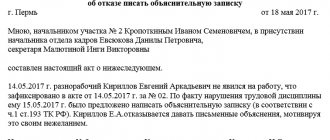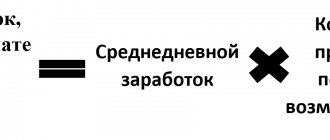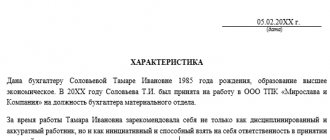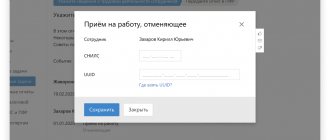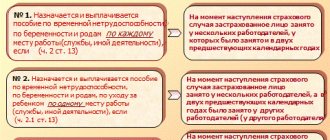Decor
A reprimand is usually formatted as follows:
- conduct an official investigation;
- they take an explanation from the guilty employee;
- issue an order indicating the type of disciplinary punishment.
In fact, these are the only official documents that reflect a reprimand against the employee.
The personnel officer can also make a corresponding note in the employee’s personal card form T-2 (there is no special column in the form). The fact that this or that disciplinary punishment was imposed on this employee.
As a rule, this is done because in some organizations the imposition of a reprimand/reprimand entails a consequence such as deprivation/cut of bonus. And since the effect of the reprimand lasts a whole year, so that when issuing an order for a bonus they do not forget to exclude this employee, they make such a note.
Also, information about the imposition of disciplinary punishment must be on hand if the employee commits a repeated offense within a year after the reprimand.
Features of issuing a reprimand
An employee will be subject to a reprimand under the following circumstances:
- Regular lateness at the beginning of the working day and/or after the lunch break (with the help of automated time tracking and an electronic pass system, it is not difficult to detect and record such an offense).
- Absenteeism is an unreasonable, without good reason, absence from the workplace for more than 4 hours in a row.
- Showing up for work while under the influence of alcohol, drugs or any other form of intoxication.
- Theft of property belonging to the company.
- Failure to comply with management orders.
- Refusal to undergo a mandatory medical examination or study safety rules if required by the specifics of the work.
The penalty is valid for 1 year, and after that it is “repaid”, that is, the employee is no longer punished. For services to the company, the reprimand can be repaid earlier than in a year, as a measure of reward for the employee.
The rules for maintaining and storing work books, approved by Decree of the Government of the Russian Federation of April 16, 2003 No. 225, indicate that entries in the employee’s work book are made strictly in accordance with the articles of the Labor Code of the Russian Federation and other federal laws.
Article 66 of the Labor Code of the Russian Federation states: “information about the employee, the work he performs, transfers to another permanent job and the dismissal of the employee, as well as the grounds for termination of the employment contract and information about awards for success in work are entered into the work book. Information about penalties is not entered into the work book, except in cases where the disciplinary sanction is dismissal.”
Thus, a record of a reprimand is not entered in the work book. Article 66 of the Labor Code of the Russian Federation clearly prohibits the entry of information about any punishment of an employee other than dismissal.
Even when an employee is dismissed on disciplinary grounds (for example, for repeated misconduct), a record that a disciplinary sanction has been imposed on the employee is not made, but only the paragraphs of Article 81 of the Labor Code of the Russian Federation are indicated.
When occupying an official position, each newly hired employee signs an employment contract, which must clearly outline the key rights and responsibilities of the parties. If, during the course of his work, an employee refuses to perform or poorly performs prescribed duties, then the employer has a legal basis to reprimand the subordinate.
When imposing such a punishment, the following facts must be taken into account:
- the severity of the offense;
- the circumstances of the incident;
- personal qualities of the employee;
- attitude towards discipline at the place of work;
- characteristics from previous places of work (if such paper is available).
A reprimand is rightfully considered one of the most severe forms of disciplinary action, which should have a sobering effect on the employee. If this does not happen, then the employer can dismiss the employee, citing failure to fulfill his professional duties. According to statistics, more than 70% of workers begin to take their work activities more seriously after receiving penalties, and a reprimand is perhaps the most effective measure in the fight against human irresponsibility.
In accordance with the Labor Code, an employer may apply the following types of disciplinary sanctions against an employee:
- official notice;
- reprimand or severe reprimand;
- termination of employment relations.
We invite you to read: Free employment contract
Punishments also include dismissal from the position held and a warning about inadequacy for the position.
A reprimand entered into the work book is regulated by the Labor Code of the Russian Federation as the most severe form of punishment (not counting the dismissal itself). When imposing a penalty, the employer must take into account the following aspects:
- the severity of the act committed;
- circumstances of the incident;
- personal qualities of the employee;
- disciplinary behavior in the workplace;
- personal reference from previous places of work (if available).
Typically, a reprimand has a sobering effect on an employee who has violated discipline. But if awareness does not occur, dismissal under the article may rightfully follow.
The following describes how to issue a reprimand and enter it in the work book (sample document).
It is important to follow the procedure to avoid negative consequences and difficulties:
- Challenging the punishment by an employee, canceling it.
- Imposition of administrative fines, prosecution.
Article 192 of the Labor Code of the Russian Federation precisely describes the rules for applying penalties:
- terms of application;
- requirements for the presentation of written explanations from the employee;
- issuance of an order;
- studying it by an employee.
There is a ban on entering reprimands into the work book. But this does not mean that such a measure does not have consequences for the continuation of work. Employee personal files are suitable for recording information regarding penalties.
It is acceptable to enter information into cards in the T-2 form. The manager can develop personal cards of his own form, and provide a special section dedicated to penalties.
Sometimes it happens that after a penalty is applied, a citizen leaves his current place. Then you may be asked to write a profile for a new company. In this document you can indicate information about penalties that were applied previously.
https://www.youtube.com/watch?v=UgjGFi6_h8A
Any penalty has a validity period of 1 year. Then it is considered that everything has been repaid. That is why in the description they write about penalties that have not yet completed their action.
A remark addressed to an employee is one of the alternatives to a reprimand.
To apply such a punishment, you need to perform several actions:
- Preparation of a memo describing the comment.
- Requirement for explanations from violators.
- Drawing up an order confirming the punishment.
- Presentation of the order to the employee against signature.
Compared to reprimands, remarks as a type of punishment are more loyal. The absence of repeated violations here also means automatic cancellation of old ones. Early removal of penalties at the initiative of one of the parties is permissible.
The law says that 1 offense can be associated with only 1 punishment. Therefore, in practice many questions arise. Can managers issue reprimands and deprive bonuses at the same time? This is completely acceptable and does not contradict current legislation.
Bonuses are considered methods of rewarding subordinates who cope with their responsibilities. If this does not happen, there is a legitimate reason to refuse material incentives. The main thing is to apply such measures only if they are strictly adopted by local regulations and are described in detail therein.
The employee is separately notified of the need to draw up an explanatory note. The reprimand itself must always be justified, related only to the employee’s responsibilities as specified in the employment agreements.
If a disciplinary violation is detected, the employer must take a detailed explanatory note from the employee outlining his version of what happened. If the employee refuses to write an explanation, the administration writes a report. It must be taken into account that an employee’s refusal to explain his violations in writing is not an obstacle to disciplinary action.
The employer must familiarize the employee with the collection order against signature and no later than three days from the date of issue of the document.
In the absence of these actions by the employer, the violator of discipline can challenge the punishment of the boss. You have three months for this. The employee can appeal to the court or labor protection authorities.
Information about the reprimand is not entered into the work book. If reprimanded again within a year, dismissal is possible. However, this happens extremely rarely.
If an employer dismisses an employee as a violator of discipline, the personnel officer makes an entry in the “Work Information” within a week. Only the record of dismissal is certified by the signature of the employer or personnel officer and a seal. It is very important that the legal basis for the dismissal of an employee fully complies with the clause and article of the modern Russian Labor Code.
The maximum validity period for penalties is twelve months. If repeated violations do not occur, then we can assume that the employee did not receive a penalty. However, the employer can remove it early. This may be the desire of the manager, the request of an employee or a trade union body.
Order
The procedure for imposing a reprimand on an employee is clearly regulated by Articles 192 – 195 of the Labor Code of the Russian Federation. Deviation from it may result in the employee appealing the imposed punishment. And if the procedure is not followed, the reprimand from the employee will be removed even if he is at fault.
After the reprimand expires, the employee is considered not to have been subject to disciplinary sanctions.
Keep in mind: all this does not imply entering a reprimand into the employee’s work record book. It reflects slightly different information.
How to record a disciplinary sanction in your personal file
Attention, the Code of Administrative Offenses of the Russian Federation establishes it for a primary violation in the amount of one to five thousand rubles for officials and individual entrepreneurs, and for legal entities - from thirty to fifty thousand rubles.
How to properly reprimand an employee
ADVICE! If an employee immediately refuses to write an explanatory note, it is better to wait the required two days to issue a reprimand: the offender may change his mind, and if he is deprived of this right by immediate punishment, this may testify against the employer in court proceedings.
07 Oct 2021 uristlaw 126
Share this post
- Related Posts
- Documents for Form 9 for a Child
- What Law Regulates the Sale of Real Estate in Bulgaria
- Is it possible to have parole under Article 228 Part 2 in 2021?
- Firewood from the Administration for Rural Areas
What information is included in the labor report?
A work book is one of the main documents of an employee. It reflects the following information:
- surname, name, patronymic of the employee;
- date of his birth;
- education;
- work experience, including information about all places of work, positions, transfers and dismissals.
This is indicated in the current rules for maintaining a work book. There is also a direct ban on entering other information into the work book.
When an employee is fired under an article, then in this case such disciplinary punishment can and should be entered into the work book.
Thus, the answer to the question - is a reprimand entered into the work book - is clearly negative.
Also see “Rules for filling out work books in 2021.”
Where can you report information about disciplinary punishment?
When an employee is reprimanded, first of all, it is reflected in the order about it. Labor legislation does not regulate further dissemination of information about the reprimand. But the paperwork has developed in such a way that a reprimand may appear in the following documents:
| Document | Explanation |
| As was said - in a personal card in the T-2 form | There is no separate line here for information about disciplinary action, but you can add this in section 10 “Additional information” |
| You can attach a copy of the order to your personal file, which includes the T-2 card | Therefore, information about the reprimand is entered either on the card or in the personal file. |
| The reprimand can be reflected in the employee’s characteristics | For example, when an employee leaves the company and asks for a reference for another job. But in this case, you should remember: if a year has passed since the imposition of the reprimand. this reprimand should be considered invalid. |
| You can enter information about the reprimand in the order on the results of work for the year or quarter | This is done to resolve the issue of bonuses for this employee. |
Remark as a disciplinary sanction
For employees, the consequences of a comment at work are much more important than the procedural design of this procedure. Especially when you consider that employers do not always strictly follow the requirements of the law, instead preferring to exploit the legal ignorance of employees. So, in some cases, employers transfer workers to another position, lower their salary or tariff rate, or even issue monetary fines - all these actions are completely illegal. In practice, the possible consequences of a comment at work can only be the following:
This is interesting: HOW TO RECEIVE MONEY COMPENSATION FOR TRAVEL ON SUBURBAN TRAINS AS A PENSIONER
How to impose a disciplinary sanction in the form of a reprimand to an employee at work
- Dismissal . The provisions of Article 81 of the Labor Code of the Russian Federation do not provide for issuing a reprimand to an employee as an acceptable basis for dismissal. However, this article assumes that committing a violation of labor discipline during a disciplinary sanction is sufficient grounds for termination of an employment contract. That is, the indirect consequence of one remark may be the subsequent dismissal of the worker.
- Entering information about collection into a personal card or personal file. The employer is obliged to enter information about the applied disciplinary sanctions into the personal files of employees, or into personal files if they are supposed to be maintained at work. In itself, such a consequence of a remark is not critical, but it can affect the attitude of superiors and colleagues in the event of a subsequent transfer of an employee or a change of manager.
- Deprivation of bonus . Directly and in themselves, the provisions of labor legislation do not consider deprivation of a bonus after a reprimand as a direct consequence of this disciplinary sanction. However, local regulations and provisions on bonuses and disciplinary sanctions may provide for the assignment of bonuses only to employees who do not have valid comments or reprimands, or a reduction in the amount or frequency of such additional rewards.
- Record the fact of violation. Recording can occur by drawing up an act immediately on the spot or through the submission of a memo by the immediate supervisor to higher authorities.
- Draw up an act requiring the guilty employee to provide an explanation of the reason that led to the commission of the offense.
- Wait for a response from the employee. The employee is given 2 days to submit an explanatory statement.
- Analyze the received answer. If the explanatory note was never submitted, then record in an act the employee’s refusal to provide an explanation, or lack of response to the request.
- Make a decision on the need to impose penalties. Select the type of collection.
- Prepare a reprimand order.
- Familiarize the employee with the order. The period for review is 3 days. If an employee refuses to sign, a corresponding document must be drawn up.
The duration of any disciplinary sanction is identical. Therefore, the time when a reprimand at work is lifted will be one year from the date of imposition. The reprimand can be canceled early at the request of the employer.
Documentation of collection
A citizen needs to understand that a specific list of things for which one can be reprimanded at work is not spelled out in regulations. In virtually every case, an analysis of the employee’s actions is carried out. The most common reasons:
- Absence from work without a valid reason. Moreover, if an employee is absent without warning for more than four hours, he may be fired for absenteeism;
- If an employee comes to work under the influence of alcohol or drugs;
- If an employee refuses to undergo a medical examination if intoxication is suspected;
- If an employee violates safety measures at an event.
If you include a reprimand in your work book
Sometimes the employer puts a reprimand in the work book on principle. As a rule, this is done in the section intended for information about incentives and awards.
In this case, the employee has the right to demand that this entry be removed. If the employer does not agree, you can contact the relevant authorities:
- to the labor inspectorate;
- prosecutor's office
The employer will be given an order to bring the work record book into proper form. Therefore, entering a reprimand in the work record book may have negative consequences for the company in the form of a fine and other sanctions.
Also see “Gratitude in the work book: sample and what it gives.”
conclusions
Based on the information presented, the following conclusions can be drawn:
- It is prohibited to enter information about a reprimand into the employee’s work book;
- the only document where the presence of information about a reprimand is legally permitted is an order;
- information about the reprimand can be included in those documents where this is not prohibited by labor legislation;
- the only type of disciplinary punishment that can be mentioned in the work book is dismissal.
Also see “Entry in the work book about dismissal in 2021.”


